New Delhi: From a painter who still has a bullet lodged in his shoulder to a 23-year-old man from Khajuri Khas who had to give up his education and start plying an e-rickshaw following the northeast Delhi riots — such testimonies of several families revealed the repercussions of the violence that residents in the affected areas are living with even after two years.The testimonies are part of a report, “Commemorating two years of the North East Delhi Communal Riots”, which has been published by a group of organisations, including National Federation of Indian Women, All India Democratic Women’s Association, People’s Union of Civil Liberties, United Against Hate, Constitutional Conduct Group and Karwan-e-Mohabbat.
“The testimony of a middle-aged couple who made their livelihood by setting up a vegetable stall in weekly markets demonstrated how the riots impacted the poor in both communities. Their home was set on fire and they lost all their belongings, including valuable items bought for their daughter’s wedding, but they got no compensation because they were tenants, not owners,” the report noted.
Alleging that the authorities had failed in providing proper compensation, Gopal Pillai, former Union home secretary, said, “The first instances of assistance and continual assistance have been a total failure as even two years later, many victims are yet to get compensated.”
Professor Mridula Mukharji, who was also part of the jury, added, “Someone who incurred a loss of Rs 45 lakh received a compensation of Rs 12,500. Some others did not receive any compensation as they were on rent. This is completely a travesty of justice.”
Pointing out “errors and logical inconsistencies” in chargesheets filed by Delhi Police, the report claimed, “There has been lack of a proper and transparent investigation and a biased approach leading to lack of credibility in the overall investigative process.” It also called the Delhi government’s compensation scheme “blanket and discriminatory”.
The report recommended setting up of a judicial commission headed by a retired judge to inquire into the riots. It also suggested that the Delhi government set up an empowered group to look into all cases of inadequate and delayed compensation. Rebuilding employment opportunities and remedying education disruption faced by children are some of the other recommendations.
Stating that the “massacre was designed by the state to crush” the Citizenship (Amendment) Act-National Register of Citizens (CAA-NRC) protests, author Arundhati Roy said, “NRC was not a refugee management law, but a refugee manufacturing law, where own citizens were being made refugees… Slowly citizens are realising that this kind of hatred affects all.”
This article first appeared on timesofindia.indiatimes.com





